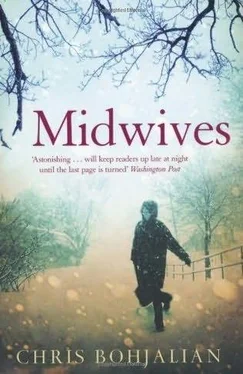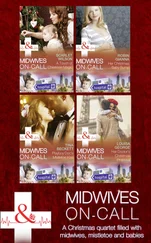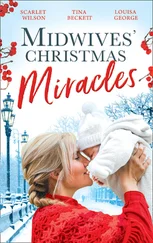Chris Bohjalian - Midwives
Здесь есть возможность читать онлайн «Chris Bohjalian - Midwives» весь текст электронной книги совершенно бесплатно (целиком полную версию без сокращений). В некоторых случаях можно слушать аудио, скачать через торрент в формате fb2 и присутствует краткое содержание. Жанр: Современная проза, на английском языке. Описание произведения, (предисловие) а так же отзывы посетителей доступны на портале библиотеки ЛибКат.
- Название:Midwives
- Автор:
- Жанр:
- Год:неизвестен
- ISBN:нет данных
- Рейтинг книги:5 / 5. Голосов: 1
-
Избранное:Добавить в избранное
- Отзывы:
-
Ваша оценка:
- 100
- 1
- 2
- 3
- 4
- 5
Midwives: краткое содержание, описание и аннотация
Предлагаем к чтению аннотацию, описание, краткое содержание или предисловие (зависит от того, что написал сам автор книги «Midwives»). Если вы не нашли необходимую информацию о книге — напишите в комментариях, мы постараемся отыскать её.
Midwives — читать онлайн бесплатно полную книгу (весь текст) целиком
Ниже представлен текст книги, разбитый по страницам. Система сохранения места последней прочитанной страницы, позволяет с удобством читать онлайн бесплатно книгу «Midwives», без необходимости каждый раз заново искать на чём Вы остановились. Поставьте закладку, и сможете в любой момент перейти на страницу, на которой закончили чтение.
Интервал:
Закладка:
"I don't think that would be very smart," she said, her voice soft but firm. "I don't think it will do any of us any good to make my mothers or me look like idiots."
Stephen nodded, and the music and conversation and the sound of silverware on fine china returned. "I agree. I'm just telling you what some of my peers believe," Stephen said.
My father sat back in his chair. "So I was right. You'll fill the jury with people who believe in home birth."
"I doubt I can 'fill' it with them. But if I find people who seem to think that way, I'll try and keep them." He turned to face my mother directly and continued, "I'm sorry. I was simply hoping to convey how complicated all of this is, even for me."
"Even for you," my father said. "Imagine."
"As a lawyer, Rand. That's all I meant."
"I understand."
Stephen sighed. "I've probably swallowed half my shoe already. But at the risk of putting even more in my mouth, I'll tell you something else: Right now I probably understand better who I don't want on the jury than who I do."
"And that is?" my father asked.
"Well, let's see. First of all, I'm going to try and stay away from women of childbearing age. I'm not sure they could separate themselves from the victim. And I don't want any nurses or doctors or EMTs. No volunteers from town rescue squads. The last thing we need are people who aren't nearly as knowledgeable as they think they are trying to second-guess Sibyl. And, of course, there won't be a soul on the jury who's ever been anywhere near a bad birth experience-ever had one, or seen one, or heard about one real close to home. That I can assure you."
"Will you want more men or women?" my father asked. My mother's fingers were still resting upon her neck, and although she was staring right at Stephen-and probably had been since he apologized a moment earlier-I don't think she saw him. I'm sure on some level she was listening, and I'm sure she would have jumped back into the conversation if she needed to defuse a bomb smoking between her husband and her attorney; otherwise, however, she seemed content to sit quietly and let the two men waste energy on conjecture.
"It's not as simple as a male-female thing. I wish it were. I think in this case it's more important to get smart people."
"Because of the experts?"
"Yup. A smart person will hang in there when they're hearing testimony about something like standards of care. Or what the autopsy showed-and didn't show. And smart people won't automatically assume that the State's doctors or experts have more credibility than ours."
And so when the lawyers began building a jury-asking question after question of the farmers and store clerks and elderly loggers who comprised the pool-I understood whom we wanted on the panel and whom we did not. I sat in the first row of benches directly behind my mother and Stephen and Peter Grinnell, with my father on one side of me and my grandmother on the other, and I made a list in my mind of who I hoped would be left in the end in the jury box.
A pair of law clerks from Stephen's firm and Patty Dunlevy sat with my family on our bench, but the three members of Charlotte's family had their bench to themselves. People wanted to give them their space. Otherwise there were no free seats in the courtroom.
The Danforth and Fugett family benches were in the same row, but our families were buffered by a wide aisle and the private investigator and the clerks. Only when I was studying the pool of jurors sitting along the part of the wall nearest the door was there any risk that a part of the Alabama contingent might turn a head and I'd be caught staring, or I'd have to look instantly away to avoid what I feared would be a hateful glare.
One of the few times I was watching the Fugetts, however, a moment just after the original group of twenty-eight jurors had been seated, I realized one important part of their family was absent. I leaned around my grandmother and asked the clerk beside her, a young woman I'd been told was named Laurel, "Where's Reverend Bedford?"
"He'll be testifying," she whispered, "so he's sequestered. He won't be in the courtroom until we get to the closing arguments."
"Will Foogie come?"
"Foogie?"
"The little boy," I answered, and then, remembering there were actually two little boys now, added quickly, "the older boy."
"You mean Jared, don't you? No, he won't be here. At least I wouldn't think so."
I fell back against the bench relieved. It was bad enough having to sit within ten or twelve yards of Charlotte's sister and mother; it would have been almost unendurable to watch a lonely widower with one of the two young sons he was now forced to raise on his own.
"This is no small distinction," Bill Tanner said to the jury pool, pacing slowly between his table and the high bench behind which the judge sat. "An important part of your job will be to understand the difference between reasonable doubt and all conceivable doubt-there's a difference-and to render a verdict accordingly."
I had no idea whether Tanner was a fly fisherman, but I knew enough adult men in Reddington who fished that I imagined at the time that he was: He walked as if he were wading through shallow water, stepping high and moving with care. He was tall and thin, and in front of a jury he spoke like a grandfather. He seemed patient and methodical, the sort of fellow who would tie a fly with meticulous care and then stand happily in a river casting his line for hours.
I had heard Tanner's voice twice before on the television news, but that morning was the first time I heard it live, and the first time I heard him speak at length: It was hard to believe this pleasant man was capable of saying the terrible things about my mother he already had, or that he would soon say much worse.
His hair was mostly gray, and his face deeply lined. He often held his eyeglasses by an earpiece in one hand as he spoke, exposing deep red marks along the sides of his nose where they usually rested. I guessed he was somewhere in his late fifties.
"What about you, Mr. Goodyear? Would you feel you had to have one-hundred-percent certainty of a person's guilt before you could convict him, or would the elimination of all reasonable doubt do?" he asked.
"Nothing in this world is a one-hundred-percent sure thing," he answered. Earlier in the morning he had mentioned he was a pressman for a printer in Newport, and his fingertips were discolored by ink.
"Except taxes," Tanner said. Although he was holding his eyeglasses in one hand, he was holding a piece of paper with a grid on it in the other. The grid listed the possible jurors by row, so Tanner knew all of the people by name.
"Do you have any children, Mr. Goodyear?"
"Two boys."
"How old are they?"
"One's ten and one's seven. No, eight. He's about to turn eight. Next week."
"You're married?"
"Yup. For twelve years."
"What does your wife do?"
"She works two days a week at the school cafeteria. And the rest of the time she raises the boys."
"You grow up around here?"
"I did."
"Lucky man," he sighed. "We have here one of the most beautiful parts of the state."
"I think so."
"Where were you born?"
"Newport."
"In this very city?"
"Yup."
"Hospital?"
"Uh-huh."
"Your boys? How about that? Where were they born?"
"Same hospital."
"North Country?"
"Yup."
These days, we envision lawyers using podiums and microphones. Back then in our corner of rural Vermont, that wasn't the case. Like stage actors, the lawyers spoke loud enough to be heard, and they did it without seeming to raise their voices. They held their notes in their hands when they spoke, and if they needed a place for papers, they used their tables.
"Were the labors easy? Hard? Somewhere in between?"
Читать дальшеИнтервал:
Закладка:
Похожие книги на «Midwives»
Представляем Вашему вниманию похожие книги на «Midwives» списком для выбора. Мы отобрали схожую по названию и смыслу литературу в надежде предоставить читателям больше вариантов отыскать новые, интересные, ещё непрочитанные произведения.
Обсуждение, отзывы о книге «Midwives» и просто собственные мнения читателей. Оставьте ваши комментарии, напишите, что Вы думаете о произведении, его смысле или главных героях. Укажите что конкретно понравилось, а что нет, и почему Вы так считаете.











